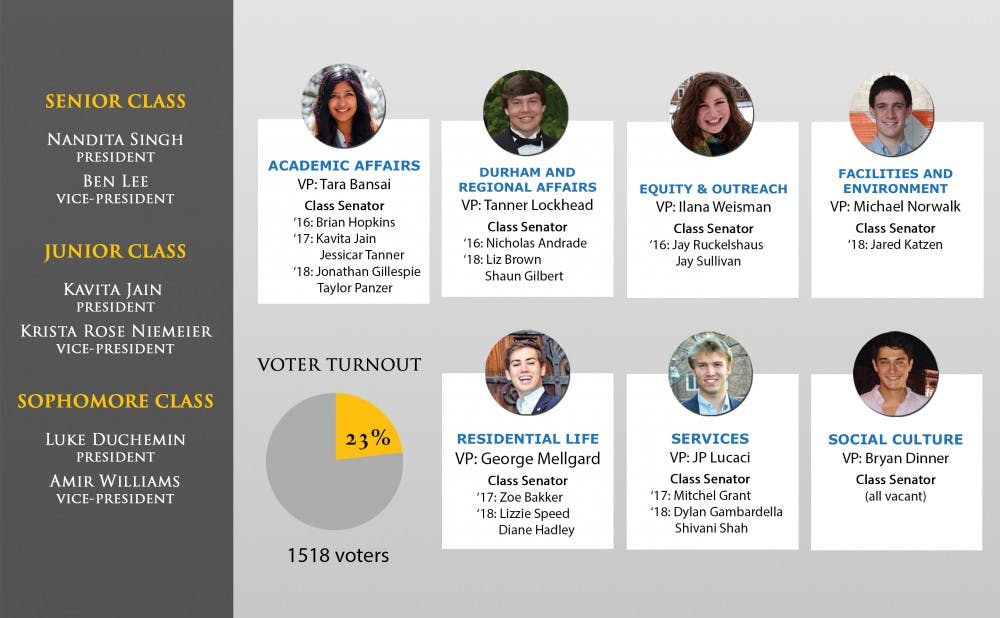Editor's Note: In a tweet shortly after 1 a.m., The Chronicle incorrectly identified the winner of the vice presidential election for the Class of 2017. Errors in the process of calculating votes for write-in candidates led to the misinformation. Additionally, an earlier version of the graphic miscategorized the committees some senators were elected to. The Chronicle regrets the errors.
In an election marred by technical difficulties and few candidates, undergraduates selected next year's Duke Student Government committee vice presidents and senators, along with class council members.
A total of 1,518 students—23 percent of the student body—voted in the vice presidential portion of the election. In the only contested vice presidential race, sophomore Tara Bansal defeated sophomore Annie Adair for vice president for academic affairs, winning 60 percent of the vote. The election ran from 10 a.m. to 10 p.m. after being delayed three hours because of a University Center Activities and Events listserv malfunction, said DSG Attorney General Max Fischer-Zernin, a senior.
“The listserv is updated regularly to ensure that everybody is on it,” Fischer-Zernin said. “Last night, it was supposed to do an automatic update, but the update failed so this morning a manual update started.”
The manual update, which started at 7 a.m., coincided with the release of the DSG ballot and prevented the ballot from being sent to the vast majority of the student body. By 10 a.m., however, the ballot had been distributed to all eligible voters.
“The constitution requires that there be a 12 hour voting window, so by sending the ballot out at 10 a.m., we were totally fine because the election ended at 10 p.m.,” Fischer-Zernin noted.
Another issue with the UCAE listserv was that the sophomore and junior ballots were switched, so rising juniors were briefly voting for senior class officers and vice versa.
“Only 32 people were affected [by the mix-up],” Fischer-Zernin said. “For those 32 people, we had them email UCAE with their votes to be entered manually.”
By 10 a.m., all ballots were legitimate and there were no issues reported by individual voters from that point forward.
A final error, however, excluded the name of one of the sophomore candidates for equity and outreach senator, rendering that part of the ballot invalid.
“With the help of the East Campus Council, we will be doing a special election for the incoming sophomore equity and outreach [Senate position],” Fischer-Zernin said.
The special election will be held from noon Wednesday, April 15 to noon Thursday, April 16 to ensure that word gets out about the unscheduled election time.
Fischer-Zernin said he felt that the low voter participation rate of 23 percent can be explained by several factors.
“The low voter turnout is not particularly surprising,” he said. “This vote is for many seats, and each [seat] has much less to spend on campaigning, so there was far less buzz when compared to a DSG Young Trustee or presidential election.”
He compared this election to a United States Congressional midterm election, which generally sees substantially fewer voters than a presidential election.
In addition to Bansal, the other elected committee vice presidents were sophomore Tanner Lockhead for Durham and regional affairs, sophomore Ilana Weisman for equity and outreach, sophomore Michael Norwalk for facilities and the environment, sophomore George Mellgard for residential life, junior JP Lucaci for services and junior Bryan Dinner for social culture.
Rising seniors elected Nandita Singh as class president and Ben Lee as class vice president. In addition, they elected Brian Hopkins as senator for academic affairs, Jay Ruckelshaus and Jay Sullivan as senators for equity and outreach and Nicholas Andrade as senator for Durham and regional affairs.
Rising juniors elected Kavita Jain as class president and write-in candidate Krista Niemeier as class vice president. They also elected Jain and Jessica Tanner as senators for academic affairs, Zoe Bakker as senator for residential life and Mitchell Grant as senator for services.
Rising sophomores elected Luke Duchemin as class president and Amir Williams as vice president. They also elected Jonathon Gillespie and Taylor Panzer as senators for academic affairs, Sean Gilbert and Liz Brown as senators for Durham and regional affairs, Jared Katzen as senator for facilities and the environment, Lizzie Speed and Diane Hadley as senators for residential life and Dylan Gambardella and Shivani Shah as senators for services.
Rising sophomores had the highest level of participation in class officer and senator elections, with 845 student votes compared to 316 rising junior and just 250 rising senior votes. The total number of voters for these positions—1,411—is fewer than the number of voters for committee vice presidents because students were not required to vote for both committee vice presidents and class-based offices.
Get The Chronicle straight to your inbox
Signup for our weekly newsletter. Cancel at any time.

